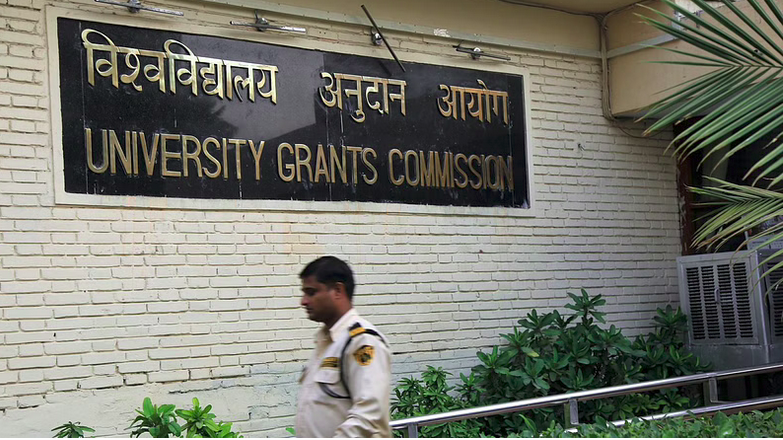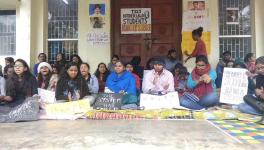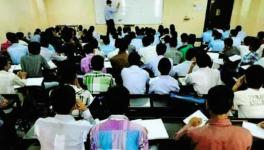Teachers' Unions Slam UGC for SWAYAM Reminder to Central Universities

Image Courtesy: ThePrint
University Grants Commission (UGC), the regulatory body for all universities in the country, has asked the Vice-Chancellors of Central universities to adopt courses offered through the SWAYAM platform to enable students to avail courses online.
SWAYAM (Study Webs of Active Learning for Young Aspiring Minds) is an online platform where students from class IX to post-graduation can access online courses curated by experts. In his letter to the vice-chancellors, UGC secretary Rajnish Jain asked the universities to file the action taken report to the commission by June 15. As per the UGC regulations 2021, any institution can offer up to 40% of the courses in any semester through online mode.
" Since the launch of the SWAYAM platform in 2017, 7,115 courses have been offered with an enrolment of 2.72 crore learners and 11.13 lakh certificates issued through the platform. In addition, during the lockdown owing to the COVID-19 pandemic, the SWAYAM platform saw increased usage by nearly 2.5 lakh times. The Ministry of Education conducted an online survey in May 2022 to understand students' outlook on SWAYAM MOOCs. This survey provides inputs and insights into students' preferences at the national and state levels. The survey shows that more than 70% (10,000+) spanning 338 universities/institutions across 29 states expressed interest in availing credit transfer of SWAYAM courses. I would like to reiterate that SWAYAM provides flexibility and opportunity to students in multiple courses and avail multiple certificates. Therefore, I request all universities to adopt courses offered through the SWAYAM platform so that the student community is able to get maximum benefits," the letter read.
The letter seems to align with the recently adopted New Education Policy, which has strongly advocated a blended mode of learning through online and offline methods. However, the teachers' unions have expressed their concerns regarding the reduction in the strength of the workforce and quality of education after the implementation of new directives.
Commenting on the UGC letter, Abha Dev Habib, former Executive Council member, Delhi University, told NewsClick that the harm has already been done given Delhi University chose Academic Bank of Credits to offer online courses.
"UGC has just reminded us about the regulations approved in March 2021. The regulations came up for discussion in the academic council in August 2021. The point remains that, be it ABC mode or SWAYAM mode or even FYUGP by Delhi University, all talk about blended learning. Our concerns remain with smaller modules that may be taken through online learning mode. If a student chooses modules through online mode, what will the university do with the teachers? The government intends to increase the gross enrolment ratio without any increase in the allocation of resources. They are brazen in implementing NEP even if it comes at the cost of reduced work strength."
NEP, which guides the policy directions on education in the country, also recommended using platforms like SWAYAM in blended learning mode.
"All universities will offer PhD and Masters programmes in core areas (such as Machine Learning) as well as multidisciplinary fields ("AI + X") and professional areas (healthcare, agriculture and law). They may also develop and disseminate courses in these areas via platforms, such as SWAYAM. For rapid adoption, HEIs may blend these online courses with traditional teaching in undergraduate and vocational programmes," the policy read.
Echoing similar sentiments, Rajesh Jha, former Executive Council Member, told NewsClick that the letter's intent is in question, given sample of 10,000 students for a vast country like India is not enough to gauge the effectiveness and learning of the courses.
"The online classes as a replacement of on-campus classes are not effective and feasible due to lack of infrastructure and equipment with the majority of students. Now, remote working has been junked by even new-age business leaders like Elon Musk. The challenge of remote education gets more aggravated as we have three-fourths of students coming from SC, ST, OBC, EWS, PWD, and far-flung areas like north-east India & Jammu and Kashmir, who are mostly on the wrong side of the digital divide."
Jha added that access to a smartphone does not translate into effective learning.
"According to the National Sample Survey (2014), only 27% of households in India have some member who has access to the internet. Owning a smartphone does not mean having 'access' to the digital medium. Effectively, only 12.5% of the households have internet access at home on a computing device. The data also varies from state to state. For example, the sample survey says that in Andhra Pradesh, 30% of rural households have access to the internet, but only 2% of the people are likely to have 'effective' internet access at home, that is, with a computing device. This will ruin the quality of teaching and the workload of teachers."
Jha emphasised that the UGC is increasingly citing the survey of the Ministry of Education, but its research methodology has not been revealed, raising serious questions about class and caste bias.
Get the latest reports & analysis with people's perspective on Protests, movements & deep analytical videos, discussions of the current affairs in your Telegram app. Subscribe to NewsClick's Telegram channel & get Real-Time updates on stories, as they get published on our website.
























